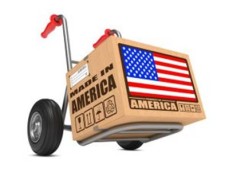The 2024 Democrat and Republican Manufacturing Platforms

Photo Credit: CNET
By Daniel Domsky
Manufacturing is a cornerstone of the U.S. economy, contributing 11.4% to gross GDP, providing 1 in every 13 American Jobs, and driving innovation and technological advancement. The policies and regulations that affect how the manufacturing sector is regulated shift depending on the political party that holds the Oval Office. The Democratic and Republican parties hold contrasting views on supporting and enhancing manufacturing with the upcoming 2024 presidential elections; the impact and effectiveness of differing policies are points of contention.
Over the past few decades, the U.S. manufacturing sector has experienced significant shifts and challenges. Globalization has led to increased competition from countries with lower labor costs, resulting in many manufacturing jobs being outsourced. Automation and technological advancements have further transformed the industry, improving efficiency and reducing the need for human labor. In addition, foreign firms have gained some market share in the top 20 industries. Trade policies have also played a crucial role. Agreements like the North American Free Trade Agreement (NAFTA) and t the United States-Mexico-Canada Agreement (USMCA) increased cross-border regional trade. These trends have collectively reshaped the manufacturing landscape, posing unique challenges to different presidents.
Democratic Platform
On the campaign trail, Harris’s platform, the 85-page, “A New Way Forward for the Middle Class’” emphasizes strengthening the competitiveness of American manufacturing through tax credits and the expansion of federal, state, and local investment programs. One proposed policy is creating low—or zero-interest loans for small businesses to boost competitiveness. Another policy is creating incubators and innovation hubs to benefit from investments in semiconductor factories. The policy book also mentions removing regulatory “red tape” by allowing small businesses to file taxes more easily and reducing excessive licensing requirements
Finally, Kamala Harris pledged to continue the current administration’s work at the Economic Club of Pittsburgh and proposed an additional $100 billion plan to boost American manufacturing.
Republican Platform
In the 2024 election cycle, the Republican Party Platform states they would “establish the United States as the Manufacturing Superpower” without providing specific details on how to achieve it. On the campaign trail, Trump mentioned he would place a 100% tariff on Mexican automobiles to boost American manufacturing. His proposed “new American industrialism” would also lower the U.S. corporate tax rate from 21% to 15%. Trump says the new industrialism will create millions of jobs but hasn’t provided specific proposals on the impact or cost of his projects.
Takeaway
The Democratic and Republican parties recognize and support the importance of American manufacturing but hold contrasting views on how to help the industry in the best way. Democrats emphasize revitalizing American manufacturing through comprehensive policy and investment, supporting unionization, and helping small and medium-sized manufacturing companies. Republicans advocate for a free-market approach, reducing regulatory burdens, encouraging private sector-led growth, raising tariffs on foreign companies, and lowering the corporate tax rate. With the upcoming 2024 presidential elections, the impact and effectiveness of differing policies are on the ballot. The entire manufacturing industry will have to wait and see what happens.
About the Author
Daniel Domsky studies Economics and International Relations at American University in Washington, DC. Originally from San Luis Potosí, Mexico, Daniel worked for over ten years traveling across villages and cities across central Mexico. With this experience, he saw firsthand how economic development and investment can improve the lives of millions.
Over his academic career, Daniel has focused his studies on issues surrounding supply chain shifts, transnational migration, and economic development. Daniel has previously held internships at the Embassy of Mexico in the United States and at the Democratic National Committee.



